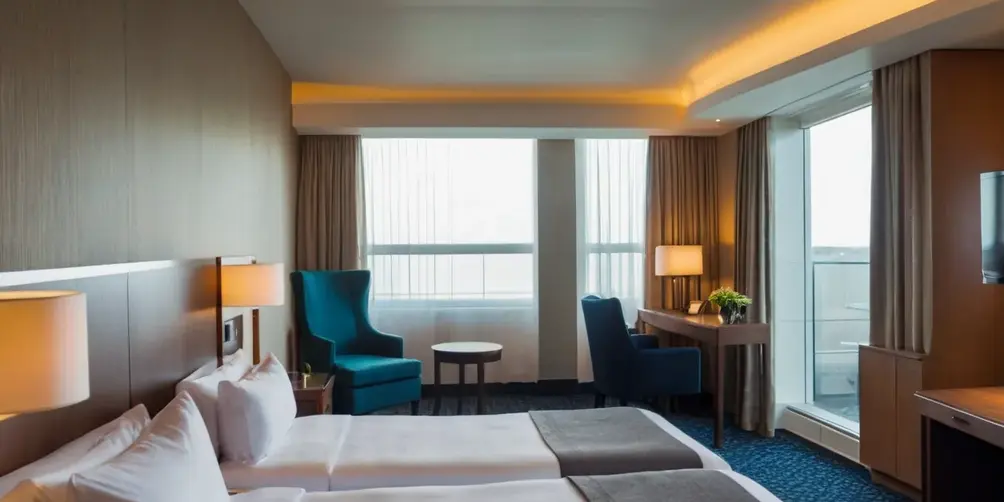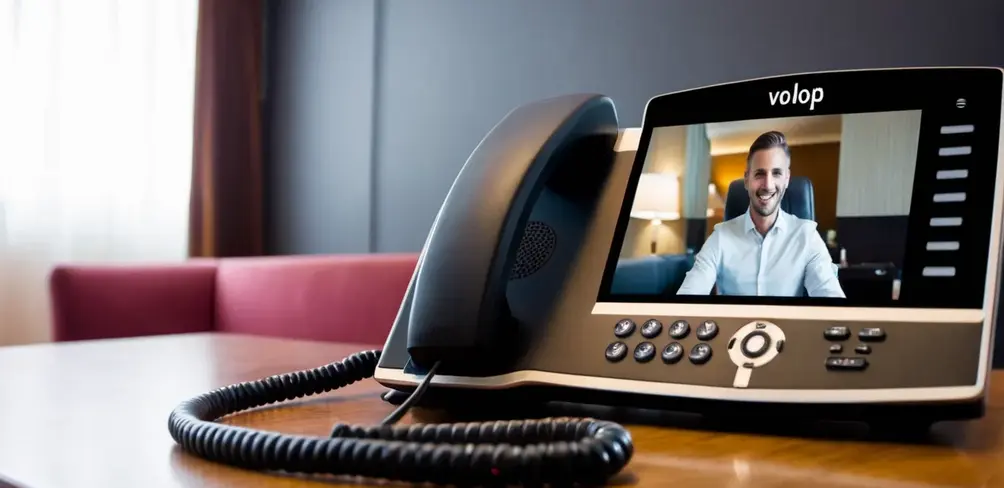VoIP for Small Hotels: The Complete Guide
For small hotels, communication is key. You need to be able to easily connect with guests, partners, and staff. An outdated phone system can hold your hotel back. VoIP (Voice over Internet Protocol) phone systems are quickly becoming the top choice for small hotels looking to upgrade their technology and improve communication.
In this complete guide, we’ll cover everything you need to know about implementing VoIP in a small hotel environment. We’ll look at:
- What VoIP is and how it works
- The benefits of VoIP for hotels
- Features to look for in a hotel VoIP system
- Leading VoIP providers for hotels
- Cost comparisons with traditional phone service
- How to choose the right system for your property
Let’s get started!
What is VoIP and How Does It Work?
VoIP stands for Voice over Internet Protocol. It allows you to make and receive phone calls over an internet connection rather than traditional analog phone lines.
With VoIP, your voice is converted into digital packets that are transmitted over the internet. When someone calls your VoIP number, the system converts the packets back into an audible voice conversation.
For this to work, you need:
- A high-speed broadband internet connection
- VoIP phones or adapters
- A VoIP service provider
The service provider handles the technology on their end. As a hotel, you simply use VoIP phones onsite to make and take calls through your internet network. The phones look and work just like traditional phones.
VoIP systems provide advanced call management features beyond what legacy landline systems offer. And because calls happen over the internet, you can reduce costs compared to analog phone services.
Benefits of VoIP for Hotels
There are many advantages to switching your hotel’s phone system over to VoIP technology:
Lower Costs
VoIP calls over the internet are much more affordable compared to traditional analog calls. Plus, VoIP systems themselves tend to cost less than legacy on-premise PBX systems when you factor in hardware and maintenance. Usually, you can save 40-60% on your phone bill by going with a VoIP system.
Some VoIP services charge a flat monthly fee per user. Others bill you based on usage. In either case, your total phone costs are likely to decrease substantially.
Improved Call Quality
With VoIP systems, calls are digital rather than analog. This results in improved audio quality, reducing background static and echoing. Digital transmission over the internet allows for higher call fidelity.
Since VoIP calls travel as data packets, they are encrypted and less vulnerable to tapping than analog calls. This enhances call privacy and security.
Flexibility
Cloud-based VoIP systems allow you to be flexible with your setup. New phones can be added to the network quickly as you expand or change locations. Users can even make and take calls remotely with VoIP apps for their smartphones or laptops.
With VoIP, you’re no longer tied to a clunky onsite PBX system. The service provider handles maintenance and upgrades for you in the cloud. This frees up your time and doesn’t require an expensive IT team.
Mobility
As mentioned above, VoIP integrates seamlessly with mobile devices. Hotel staff can take calls and access voicemails on the go. Features like call forwarding, transfers, and conferencing are maintained even on mobile apps.
For guests, this means being able to reach hotel staff from their own smartphones at any time.
Advanced Features
Modern VoIP systems come packed with features that simply aren’t available on old landline systems:
Auto attendants to route calls based on guest prompts
Voicemail to email transcription
Call analytics for tracking volumes and agents
Conference calling
Call queues to handle multiple incoming calls
Integration with CRM software
Toll-free numbers to improve accessibility
These kinds of features allow hotels to deliver a top-notch guest experience and run operations smoothly behind the scenes.
Hotel VoIP System Features
When researching and comparing VoIP providers for your hotel, there are some must-have features to look out for:
Call Management
A robust call management system helps you route calls intelligently to match guest needs. For example:
Use auto attendants with prompts so callers can self-direct (“Press 1 for the front desk, press 2 for reservations,” etc.)
Enable call queues to handle multiple callers and route them to the right agents
Establish ring groups so calls ring multiple phones until answered
With smart call flows, calls get to the right people without frustrating hold times for guests.
Online Portal
A web-based management portal lets you configure the system and make changes yourself as needed. This allows you to control settings like:
Auto attendant menus
Extension assignments
Call routing
Voicemail settings
Ring groups
Being able to manage your hotel VoIP system through an online dashboard means you don’t have to rely on the provider for every change.
Voicemail Management
Voicemail management gets easier with hotel VoIP systems. Features like voicemail to email and group distributions for messages allow your team to stay on top of guest inquiries without constantly checking the phone system.
Voicemails can be monitored in real-time or archived for record keeping. Personalized voicemail greetings also make the experience friendly for callers.
 Reporting
Reporting
Call analytics and reporting provide visibility into call volume and performance. With a hotel VoIP system, you can generate reports on:
Average hold times
Abandoned call rate
Peak calling times
Call volume by department
Agent performance
Access this data directly through your online management dashboard to optimize staffing and call handling.
CRM Integrations
Integrating your VoIP platform with hotel property management systems or CRM software results in a unified guest profile. This way, guest information can be automatically displayed to agents handling calls for smoother and more personalized service.
Popular platforms like Salesforce, Zendesk, Microsoft Dynamics, and others can connect with VoIP to enhance guest interactions.
| Provider | Ooma Office | Mitel | Nextiva | RingCentral |
|---|---|---|---|---|
| Pricing | $19.95/user/month | Customized per property | $18.95/user/month | $24.99/user/month |
| Calling Features | 📞 75+ calling features | ☁️ Cloud PBX system | 🎙️ Auto attendants | ☁️ Cloud phone system |
| Key Features |
|
|
|
|
Which is the Best Hotel VoIP System?
The right VoIP system for your hotel depends on your specific needs and priorities. As you evaluate providers, consider aspects like:
- Number of users/extensions needed
- Desired call management features
- Integration with your hotel PMS or CRM
- Monthly budget per user
- Ease of administration
- Scalability for future growth
Work with potential vendors to demo the platform and ask questions. Most offer free trials so you can test out the system.
It’s also helpful to read VoIP reviews to see real customer experiences beyond the sales pitches. Focus on providers catering specifically to hotels rather than general business offerings.
What is the Cost of Hotel VoIP Service?
VoIP systems for hotels represent a major cost savings compared to traditional legacy phone technology. According to Software Advice research, most small hotels can save 40% or more per month by switching to VoIP.
Ooma advertises 75% savings versus basic landline service. RingCentral claims their system costs 70% less than legacy PBX. Similar savings are touted by leading business VoIP providers.
Exact VoIP pricing depends on the features, number of users, and provider you choose. But in general, you can expect to pay:
- $20 – $30 per user per month for basic service
- $35 – $50 per user per month for advanced features
Some providers charge a flat rate for unlimited users while others charge per user or extension. The more features included, the higher the price.
For a 10 room boutique hotel with 5 staff users, a VoIP system could cost between $125 – $250 monthly. A 50 room mid-size property with 15 users may pay $500 – $1,000.
Upfront costs for handsets and any onsite hardware also factor in. However, most providers let you spread these costs over 12 or 24 months to keep initiation fees low.
When comparing this to traditional analog lines or an onsite PBX system, VoIP represents at least a 30-50% savings in monthly fees. And that doesn’t account for one-time hardware and installation costs of legacy systems.
Is VoIP Right for My Hotel?
For most small hotels, VoIP systems are the clear choice over older legacy phone technology. VoIP improves call management, mobility, call quality, and hotel-guest communications. Plus, you gain robust features and significantly lower your ongoing phone bills.
Switching your hotel’s communications over to a modern VoIP platform futureproofs your technology while delivering immediate benefits. The flexible, cloud-based systems scale smoothly over time as your business grows.
To determine if VoIP is the right fit, ask yourself these questions:
Is our current phone system outdated and limiting?
Are we paying too much monthly for basic phone service?
Do we need better call routing, queues, or IVR options?
Do we want to integrate our phone system with hotel software?
Do we need a system that can easily add new users and locations?
If you answered yes to any of these questions, your hotel can likely benefit from upgrading to a scalable VoIP phone system.
How to Choose a VoIP System for Your Hotel

Features – The system should have all the call management tools your hotel needs both now and as you grow. Prioritize must-haves like call queues, IVR, voicemail management, and integrations.
Ease of Use – The system should be simple for non-technical staff to use on a daily basis. Look for an intuitive web-based dashboard and handsets. Automatic upgrades in the cloud are ideal for a hassle-free system.
Customer Support – Find a provider with multiple support channels like phone, email, live chat, and online knowledgebase. They should offer implementation guidance and 24/7 ongoing technical assistance.
Reviews – Don’t just depend on the vendor’s promotional materials. Read third-party reviews on sites like Capterra and G2 to see real customer experiences with the system and provider.
Pricing – Budget a monthly cost per user or extension to stay within the affordable small business VoIP range. Watch for hidden fees or complex pricing models.
Scalability – Ensure the system can seamlessly accommodate new users, features, locations, and integrations as your hotel grows.
By evaluating providers based on these key criteria, you’ll find the ideal VoIP platform to meet your hotel’s unique needs now and in the coming years.
The Bottom Line
Outdated legacy phone systems hold hotels back from providing smoother guest and staff communications. Modern VoIP platforms solve this by offering advanced call management capabilities, easier administration, remote mobility, and lower costs.
For small hotels, moving your phone system to the cloud with VoIP improves key aspects of your business from guest experience to staff efficiency. It’s an affordable technology investment that delivers immediate benefits and long-term scalability.

 Reporting
Reporting